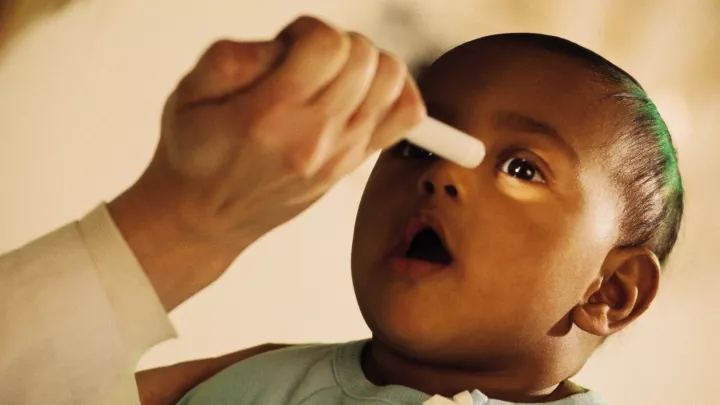Vision Development Program (Neuro-Ophthalmology)
Children are not born with the ability to see—it’s something they learn in the first few years of life. When your child is born with an eye defect, it affects the quality of the image that gets to their brain. It is important to address congenital defects (present from birth) in a timely manner. Treatment while the brain is learning promotes healthy vision development.
Children’s Hospital Los Angeles is one of the only pediatric centers in the United States with a team of full-time neuro-ophthalmologists. Our pediatric specialists are experts in coordinating eye development with brain development. They understand when and how to treat the underdeveloped vision centers in young children who have eye birth defects.
Pediatric Neuro-Ophthalmology: Why Choose Us
The Vision Center is part of a premier children’s hospital with access to specialists who can meet all your child’s needs. When you entrust your child’s vision care to our specialized team, your child benefits from:
- Precise diagnosis: Our specialists know how to accurately measure peripheral vision loss in young children. This measurement is difficult to get in children, but it is critical in guiding treatment.
- Multidisciplinary approach: Children with eye birth defects and developmental challenges need a team of experts who provide coordinated care. Our ophthalmology team works with endocrinologists, neurosurgeons, neuropsychologists and others to ensure your child has everything they need in one place.
- Compassionate care: It can be challenging to understand what young and nonverbal children can see or comprehend. We meet children where they are and know how to assess and improve vision in children of all ages and developmental levels.
- Robust neuro-ophthalmology research: CHLA is a leading research center for optic nerve hypoplasia and other eye birth defects. We study why these diseases happen, who they affect and how to best manage them.
Vision Development Conditions We Treat
Congenital eye defects are rare and complex, requiring unique expertise and care. Our neuro-ophthalmology team treats all eye birth defects, including:
- Coloboma
- Cortical Visual Impairment (CVI)
- Hereditary retinal detachment
- Neurofibromatosis
- Optic nerve drusen
- Optic nerve hypoplasia (ONH)
- Peters anomaly
Comprehensive Care for Eye Birth Defects
Our neuro-ophthalmology team understands the challenges of living with an eye birth defect. We offer expertise in interpreting genetic test results and managing your child’s vision development.
Genetic defects that impact vision development often affect other areas of the body too. They may accompany neurological problems and systemic disorders. That’s why we take a multidisciplinary approach to neuro-ophthalmology conditions. We coordinate with specialists in:
An eye birth defect requires lifelong care. We follow our patients through their formative years and then personalize their transfer of care as adults. We’ll help your child find a good fit for their adult care. When necessary, we can connect them to providers with expertise measuring for glasses in nonverbal adults.
Optic Nerve Hypoplasia Specialists
The optic nerve is a collection of nerve fibers that connects the eye to the brain. When the optic nerve doesn’t develop as it should, it causes a condition called optic nerve hypoplasia (ONH).
We are recognized experts in managing and understanding ONH. We follow children living with ONH through life and survey families nationwide who have children with ONH. Our goal is to better understand why ONH occurs and identify at-risk populations.
Coordinated care for ONH
Having a small, dysfunctional optic nerve affects how and if your child’s brain receives images from the eyes. ONH is the leading congenital cause of permanent blindness in children. It also puts children at higher risk for other health issues, including:
- Developmental delays
- Hormone deficiencies
- Seizure disorders
- Strabismus and other eye movement disorders
- Vision impairment
Approximately 80% of children with ONH have hormone abnormalities. Our team works with endocrinology and neurology specialists to treat these conditions. We offer coordinated and compassionate care for children with hormone issues and developmental delays caused by ONH.
Expertise in Eye Tracking Problems in Children
Children with developmental delays and eye birth defects cannot always communicate what they see. It makes it challenging to identify and treat problems with visual development.
We are leaders in the field of eye tracking in children. Researchers at CHLA developed artificial intelligence (AI) tools to help us understand how a child scans a page and what they can see. We learn whether a child is meeting developmental benchmarks, such as:
- Distinguishing faces
- Picking out objects in a complex scene
- Seeing colors
This technology helps us study visual development in nonverbal children with severe developmental delays.
Leaders in Neuro-Ophthalmology Research
Our ophthalmology research program is committed to understanding eye birth defects and advancing our ability to improve vision development. The focus of our research includes:
- Learning how children with cortical visual impairment (CVI) develop vision. CVI, also called cerebral visual impairment, is a condition that damages the parts of the brain that process vision.
- Identifying causes of ONH. We’re exploring causes such as possible genetic risk factors and environmental triggers.
- Studying neuropsychological development and eye birth defects. We are exploring the relationship between neurological risks—such as seizures and metabolic disorders—and eye defects.
- Treating ONH. One possibility is using stem cells to repair or replace underdeveloped optic nerves.
Our specialists are recognized leaders in their field. We are members of the North American Neuro-Ophthalmology Society (NANOS) and American Association for Pediatric Ophthalmology and Strabismus (AAPOS). We also helped found the Consortium of Pediatric Neuro-Ophthalmologists (CPNO).
Learn more about ophthalmology research at CHLA.
Expert Vision Care at Children’s Hospital Los Angeles
We tailor our services to your child’s age, condition and developmental level. Learn how we diagnose and treat pediatric vision problems.
Contact us
To schedule an appointment at the Vision Center, call 323-361-2347.


